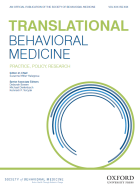
Summer 2022
Editor's Note
 I am excited to be the next Editor-in-Chief for Outlook! My vision for Outlook is to engage members in an ongoing commitment to critically reflect on research practices, trainee development, and community engagement to engage in dialogues towards a more diverse and equitable environment.
I am excited to be the next Editor-in-Chief for Outlook! My vision for Outlook is to engage members in an ongoing commitment to critically reflect on research practices, trainee development, and community engagement to engage in dialogues towards a more diverse and equitable environment.
Introducing the Climate Change Corner: A Look Ahead

This is the inaugural Outlook column on Climate Change and Behavioral Medicine, a space reserved to discuss Behavioral Medicine’s role in research, policy, and advocacy related to climate change. In the forthcoming issues of Outlook, we will read how SBM’s special interest groups describe their specific topic areas in relation to climate change.
A Call to Action: Compounded Vulnerability of Energy Insecurity, Socioeconomic Disadvantage, and Health in Climate Change

Low-income communities are often exposed to the threats of energy insecurities, environmental hazards, a higher burden of preexisting health conditions, and are least likely to have resources to address the compounding vulnerabilities that are worsened by climate change.
Slowing Climate Change: How Active Transport Can Benefit Your Environment and Your Health

Active transportation has been associated with improved health outcomes (e.g., executive function and cognition) and increased longevity, while programs promoting active transportation can help combat climate change by decreasing air pollutants and protecting environmental resources.
Don’t Take a Donation Vacation!

While many of you are off enjoying the warm sun and time away from the office or lab, SBM continues to stay active all 52 weeks out of the year. We are over half way through the year now and have already accomplished so much through the Proven Science—Better Health Giving Campaign.
Promoting Health Policy with your State Representatives: A Q&A with Dr. Allyson Hughes

Communicating with representatives of national and state government is an important part of advocacy efforts to increase the reach of evidence-based behavioral interventions. Unfortunately, policy and advocacy are often overlooked in the curricula of graduate programs, leaving trainees and professionals with unanswered questions about how to incorporate advocacy efforts in their professional endeavors.
Social Determinants of Health, Social Risks, and Social Needs: What’s the Difference and How Do You Measure Them?

As behavioral medicine researchers and practitioners, we must: 1) understand the nuances in the different terminology that is used related to social health as it has implications for study design and level of impact; and 2) do a better job at incorporating social health-related measures in behavioral medicine research.
Shaping the Future of Integrated Primary Care: An Interview with Dr. Stacy Ogbeide

The Integrated Primary Care SIG recently sat down with Dr. Stacy Ogbeide for her thoughts on the importance of high-quality mentorship at all professional levels, the different pathways to engaging in IPC work, the importance of active involvement in advocacy, and much more.
How Understanding Identity Can Improve the Effectiveness of Dietary Interventions: A Conversation with Suzannah Gerber

Evidence-based behavioral medicine is crucial to help individuals make positive dietary changes and stick with those changes over time. However, there are many gaps in our understanding for what will work for whom and when.
Considerations for Enhanced Alcohol and Substance Use Assessment as VA Prepares for Increased Substance Treatment Services in Primary Care

Alcohol/substance use are prevalent among service members and Veterans. As the Veterans Health Administration strives for alcohol and substance use services in primary care settings, assessment of outcomes may need adaptation.
New Articles from Annals of Behavioral Medicine and Translational Behavioral Medicine


SBM's two journals, Annals of Behavioral Medicine and Translational Behavioral Medicine: Practice, Policy, Research (TBM), continuously publish online articles, many of which become available before issues are printed. Click below to read a selection of Annals and TBM articles that were recently made available online.
Honors and Awards
Congratulations to the following SBM members who recently received awards or were otherwise honored. To have your honor or award featured in the next issue of Outlook, please email aschmidt@sbm.org.
Members in the News
The following SBM members and their research were recently featured in journals, news articles, or videos. To have your news spot featured in the next issue of Outlook, please email aschmidt@sbm.org.
Classifieds
Visit the SBM Job Opportunities page for additional positions.
President's Message: Translating Science into Impact
In such a time of multiple and multiplicative challenges to health and quality of life, I am filled with hope by the resourcefulness, passion, and optimism of our SBM community.
Read more » >

